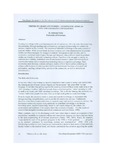Please use this identifier to cite or link to this item:
http://hdl.handle.net/10311/1237Full metadata record
| DC Field | Value | Language |
|---|---|---|
| dc.contributor.author | Nenty, H.J. | - |
| dc.date.accessioned | 2014-07-30T09:46:19Z | - |
| dc.date.available | 2014-07-30T09:46:19Z | - |
| dc.date.issued | 2004-07 | - |
| dc.identifier.citation | Nenty, H.J. (2004) Trends in graduate studies: lessons for African new and emerging universities, The African Symposium, Vol. 4, No. 2, pp. 42-58 | en_US |
| dc.identifier.issn | TX 6-342-323 | - |
| dc.identifier.uri | http://hdl.handle.net/10311/1237 | - |
| dc.description.abstract | Creating knowledge is the most fundamental role of a university. All other roles like preserving, disseminating (through teaching and publications), and applying knowledge for community services, depend on this function. The creation of utilizable knowledge is the main concern of graduate studies. While several in these functions and in the administration of graduate studies have been instigated by changes in students’ demographics and attitudes, and by economics, social and technological changes and demands, almost all new trends in graduate studies are directly or indirectly technology-driven. Therefore in the struggle to emerge or establish their visibility, institutions with an internalised research culture and access to enhance effectiveness at achieving their traditional institutional functions of research and publication, teaching, and providing services to the community, as well in institutional administration | en_US |
| dc.language.iso | en | en_US |
| dc.publisher | African Education Research Network, http://www.ncsu.edu/aern/ | en_US |
| dc.subject | Role of a university | en_US |
| dc.subject | trends in graduate studies | en_US |
| dc.subject | graduate studies | en_US |
| dc.subject | emerging universities | en_US |
| dc.title | Trends in graduate studies: lessons for African new and emerging universities | en_US |
| dc.type | Published Article | en_US |
| dc.link | http://www.ncsu.edu/aern/symposium_main.htm | en_US |
| Appears in Collections: | Research articles (Dept of Educational Foundations) | |
Files in This Item:
| File | Description | Size | Format | |
|---|---|---|---|---|
| Nenty_TAS_2004.pdf | 3.91 MB | Adobe PDF |  View/Open |
Items in DSpace are protected by copyright, with all rights reserved, unless otherwise indicated.
